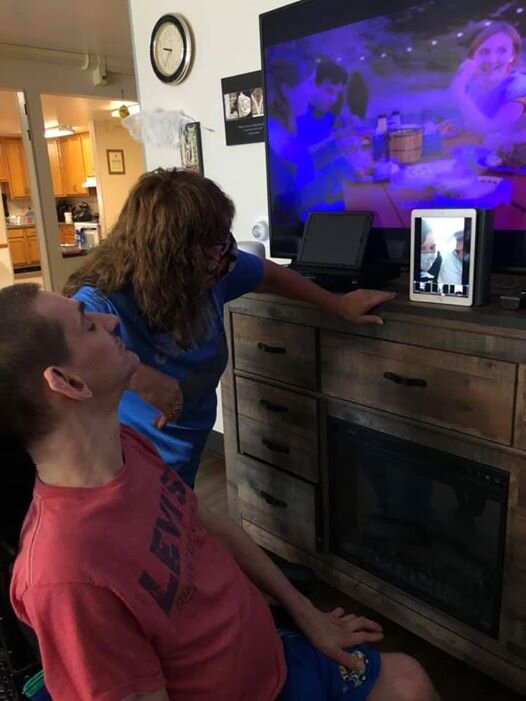Aberdeen American News Article – 10/20/20
Aspire navigates COVID-19 during 60th year
by Trent Abrego Tabrego
Published in the Aberdeen American News on Tuesday, October 20, 2020

An Aspire worker helps a client video chat in Aberdeen. The agency has been assisting people who have intellectual and developmental disabilities for 60 years.
Aspire has been in Aberdeen for 60 years now, and 2020 might be the most unique one yet in the group’s long history.
Aspire is a nonprofit agency that provides services to people with intellectual or developmental disabilities. It was founded in 1960.
The agency had big plans for its 60th milestone anniversary. Then, COVID-19 hit.
“We were one of the first to shelter in place, and we’ll probably be one of the last to come away from that or just to be able to actively engage in our community activities again,” Executive Director Jennifer Gray said.
In mid-March, Aspire made the decision to close the day center, where activities for clients take place. During the summer months, the day center was opened for a short period and participants socially distanced and had staggered schedules. It wasn’t at full capacity.
Then, in August, as virus cases rose, the doors closed again.
While day center activities have halted, Aspire has made sure that those in the program have been doing activities with staff in housing and, at times, by going outside.
“People have been back in their homes being supported by their staff in their own (housing), doing activities there,” Gray said. “If they go out and do something, it may be just to be outdoors and not doing a lot of other community-based activities.”
Not having indoor visits or activities at the day center hasn’t stopped clients from seeing their families. Instead of meeting indoors, they now have the option to visit outside one hour each week — at a safe, social-distanced area.
“For those that are interested in that, it has worked pretty well over the summer, but if you’ve noticed it’s getting a little cold,” Gray said. “So we are right now looking at some other alternatives while we continue to offer the outdoor visits.”
Not only does Aspire adhere to CDC guidelines for COVID-19, but the agency also abides by the Center of Medicare and Medicaid Services guidelines.
Under those guidelines, communities in which the positive COVID-19 rate exceeds 10% should not allow visitors indoors. Brown County’s rate has been hovering around 20%, according to the South Dakota Department of Health.
“We are closely watching our local statistics and hopeful that a downward trend might be possible soon so that we can be scheduling indoor visits for our participants,” Gray said.
Aspire has clients in seven locations where workers provide services 24/7. There is also a supervised apartment complex where staff is scheduled, but not necessarily in clients’ rooms all the time.
“It’s kind of nice, they have a little bit more independence, a little bit more privacy from our staff,” Gray said.
The agency can also serve those who do not require 24/7 care and might rent and live in their own apartments or homes.
“We send staff out to them as needed. That’s identified in their service plan,” Gray said. “So, it could be one time a week, a couple of times a week, maybe just a couple of times a month to help them balance a checkbook or (take) medications or whatever they might need.”
Having worked at Aspire for more than two decades, the biggest change that Gray has identified is that the agency is now serving an aging population. With that comes a “comprehensive Medicaid waiver,” which allows states to provide services that wouldn’t normally be covered by Medicaid.
“One of the biggest things that has changed in the last 24 years that I have been here is that the needs of the people that we are serving have significantly increased,” Gray said.
History of Aspire
When the nonprofit agency first started, it was called Aberdeen Sheltered Workshop and was modeled after a workshop in Sioux Falls, according to the Aspire website.
In 1960, there were three such operations, the third in Rapid City. The first contract for the Aberdeen Sheltered Workshop was with the Pepsi Cola Bottling Co., which needed repairs for furnished soda cases, according to Aspire’s website.
A year later, in 1961, projects started to flow in, including Coca-Cola, K.O. Lee, Jewett Drug, Kessler’s, Safeguard, and Dakota Sash. There were also opportunities for community-based projects, such as doing laundry for beauty shops and helping make baked goods.
In the mid-’70s, there were roughly 40 clients in the program. That number grew to 65 by 1978.
Now, Aspire has roughly 130 employees, according to Gray. The agency provides services to roughly 160 clients, according to its website. While Aspire isn’t a state agency, 85% of revenues come from federal and state funding.
